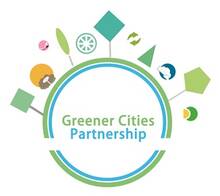The Greener Cities Partnership is a long-standing collaboration between UNEP and UN-Habitat that unites global environmental expertise with deep urban development experience to support sustainable, climate-resilient cities. UNEP contributes strengths in environmental policy, data, and multilateral coordination, while UN-Habitat brings grounded expertise in housing, basic services, and local urban systems. Together, the partnership helps translate global sustainability goals into actionable strategies, offering joint policy support, technical cooperation, and knowledge exchange to countries, cities, and communities navigating urban climate challenges.
How the partnership evolved
The Greener Cities Partnership builds on over a decade of collaboration between UNEP and UN-Habitat, first formalized in 2014 to promote sustainability and environmental integration in urban development. This long-standing partnership reflects the agencies’ complementary mandates and shared commitment to supporting greener, more resilient cities.
From 2020 to 2025, the partnership mobilized a joint portfolio of USD 39.75 million across key thematic areas: sustainable urban mobility, resource-efficient cities, and improved circularity, waste and wastewater management. Significant funding was directed to cities and countries in Latin America, East Africa, and South Asia, with projects grounded in local needs and priorities.
In 2025, the Executive Directors of UNEP and UN-Habitat reaffirmed and revitalized the partnership, aligning it with their upcoming strategies, UN-Habitat’s Strategic Plan 2026–2029 and UNEP’s Medium-Term Strategy 2026–2029. The partnership’s renewed focus brings together UN-Habitat’s expertise in housing, land, and basic services with UNEP’s emphasis on climate change, biodiversity, and pollution, providing a strong foundation for accelerated action to support communities including informal settlements.
The GCP also provides a strategic platform for joint visibility and outreach, enabling UNEP and UN-Habitat to speak with one voice on the role of cities in addressing global challenges. Through coordinated engagement at events such as the World Urban Forum, Climate and Biodiversity COPs, the UN-Habitat Assembly, and the UNEP Cities and Regions Summit, the partnership helps ensure that insights from cities inform global processes. As the world confronts the triple planetary crisis of climate change, biodiversity loss, and pollution, the Greener Cities Partnership offers a model for how UN collaboration can support more coordinated global action.
What we have achieved together
Since 2020, the Greener Cities Partnership has mobilized over USD 39 million for initiatives that are helping cities and communities become more resilient, low-carbon, and better prepared for the impacts of climate change. Working together, UNEP and UN-Habitat have delivered tangible results across a range of urban priorities—from mobility to housing to waste particularly in rapidly urbanizing regions such as Latin America, East Africa, and South Asia.
In the area of sustainable mobility, the partnership has helped cities transition to cleaner, safer, and more inclusive transport systems. In Zambia and Malawi, for example, the Solutions Plus and Sustainable Energy for Southern Africa (SESA) initiatives have supported the roll-out of electric two- and three-wheelers, reducing emissions and providing low-cost mobility options for informal workers. Across Africa, the Trans-Safe project is improving road safety with better infrastructure and data-driven planning, directly reducing accident rates and protecting vulnerable road users, while contributing to climate and public health goals.
On resilient and resource-efficient cities, joint work has improved the quality and sustainability of urban housing and services. In Senegal, Ghana, and Bangladesh, the Transforming the Built Environment project has introduced affordable, climate-friendly building materials that reduce construction costs while lowering emissions. In Tunisia and Morocco, district cooling systems supported through the partnership are helping residents cope with extreme heat, while reducing energy demand in dense urban areas.
In waste management and circular economy, the GCP is supporting practical improvements in urban service delivery. In Mombasa, Kenya, the Go Blue project is strengthening coastal resilience by integrating sustainable waste and land-use planning. In Kampala and Arusha, training programmes are helping local governments reduce food waste and build more circular, climate-smart food systems. Meanwhile, pilot projects in partnership with the Climate and Clean Air Coalition are helping cities across Africa phase out open waste burning, cutting air pollution and health risks for millions of residents.
How the Partnership helps advance inclusive, climate-resilient, and sustainable cities
The Greener Cities Partnership responds to the growing need for more integrated support that connects environmental goals with urban realities. It offers a single-entry point for governments seeking to align urban development with climate, biodiversity, and pollution objectives while strengthening national strategies, mobilizing funding, and delivering cross-cutting projects. By combining technical expertise, global policy alignment, and country-level experience, the partnership supports more coherent planning, implementation, and reporting. In doing so, it helps translate global commitments into effective, grounded action that reflects local priorities.
About the organizations
UN-Habitat is the United Nations agency focused on sustainable urban development, working to ensure that cities and human settlements are inclusive, safe, resilient, and sustainable. With a strong presence on the ground and deep relationships with local and national governments, UN-Habitat brings practical expertise in urban planning, housing, basic services, and informal settlement upgrading. Its community-based approach ensures that urban solutions are grounded in local realities and responsive to the needs of the most vulnerable.
The United Nations Environment Programme (UNEP) is the leading global authority on the environment. UNEP’s mission is to inspire, inform, and enable nations and peoples to improve their quality of life without compromising that of future generations. For over 50 years, UNEP has worked with governments, civil society, the private sector and UN entities to address humanity’s most pressing environmental challenges - from restoring the ozone layer to protecting the world's seas and promoting a green, inclusive economy. UNEP is driving transformational change by drilling down on the root causes of the triple planetary crisis: the crisis of climate change, the crisis of nature, land and biodiversity loss, and the crisis of pollution and waste.
Contact
Bernhard Barth
Programme Coordinator, Climate Change and Urban Environment
UN-Habitat
unhabitat-climate@un.org
Gulnara Roll
Head of Cities Unit
UN Environment Programme (UNEP)
